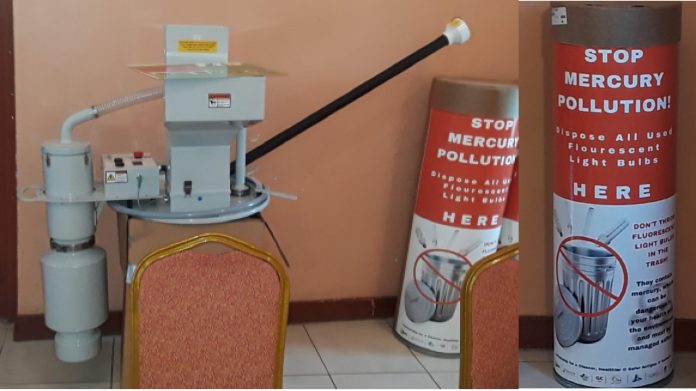The ongoing campaign to phase out mercury and eliminate its threat to human life and the environment in Antigua and Barbuda, received a major boost on July 6, 2021.
The National Solid Waste Management Authority (NSWMA), supported by stakeholders and several partners, held its official handing over ceremony of specialised bins designed for the safe disposal of used and intact fluorescent light bulbs.
Mercury is a component of fluorescent light bulbs that are safe when in use. However, if they break accidentally or through improper waste disposal, mercury vapours released into the atmosphere are potentially harmful to human life and the environment.
In speaking to the initiative, General Manager of NSWMA Daryl Spencer noted: “The Waste Management Authority always seeks to find ways to keep our population safe and recognises the importance of managing this type of waste, which is considered to be hazardous. One challenge is to collect, transport, and dispose of this type of waste that is usually comingled in our general and residential waste streams.”
Spencer further stated: “This project will now enable source separation, allowing residents to take their used, intact fluorescent bulbs to depots where they can be safely stored until collected by the Authority.”
At least 40 of the specialised storage bins will be available at several locations across Antigua and Barbuda, including most major supermarkets and hardware stores. The bins, which are all specially marked for easy identification and signage will point persons to where they are located at the depots.
The official ceremony, held at the Multipurpose Cultural Centre, was attended by stakeholders and guests.
Other speakers were Sir Molwyn Joseph, Minister of Health, Wellness and the Environment; Dr. Nicola Bird, PhD, Executive Director of Integrated Health Outreach (IHO) and Project Manager of the Mercury Phase-Out Project; Dr Linroy Christian, Minimata Focal Point and Head of the Department of Analytical Services; Ms Natalya Lawrence, National Coordinator, GEF Small Grants; and NWSMA Landfill Manager Mr Emmanuel Dubois.
The speakers stressed the importance of reducing and eventually eliminating the mercury footprint in Antigua and Barbuda to safeguard lives and the environment. One speaker, Dr Bird, also spoke of her personal experience when she suffered mercury poisoning.
Attendees at the ceremony were also given a demonstration of used fluorescent bulbs being placed into a ‘bulb-eater’.
This specialised machine pulls the mercury content from the bulbs, safely containing it for eventual shipment out of the country.
Residents are being urged to discontinue the unsafe and improper use of placing discarded mercury-added fluorescent light bulbs in their residential garbage bins or otherwise tossing them away in open spaces.
Instead, they should be placed in the specialised storage bins at the various designated locations, a full list of which will be announced to the public shortly.

